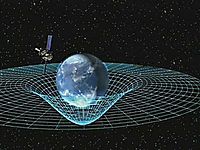
Photo from wikipedia
3-D inversion for gravity data is of great significance in geophysical quantitative interpretation. However, due to the complexity of the density distribution on the subsurface and nonuniqueness of inverse problems,… Click to show full abstract
3-D inversion for gravity data is of great significance in geophysical quantitative interpretation. However, due to the complexity of the density distribution on the subsurface and nonuniqueness of inverse problems, the classical inversion still has many shortages. The smooth constrained inversion results in redundant structures, whereas the results of the compact inversion are too focused, and excessively rely on the choice of target density parameters. In view of the above issues, we develop a 3-D combined compact and smooth inversion for gravity and gravity gradient data. The objective function is built by the combination of the minimization of field source volume and the misfit between observed and predicted data. The prior information is treated as the “target density” in the inversion process. Furthermore, in order to solve the problem of overreliance on “target density,” we improve a 3-D gravity inversion algorithm where the model constraints include the combination of compact and smooth factors. Model tests show the method can better recover the source distribution when the parameter of target density is not given. Also, we make a comparative analysis of the inversion results of different gradient components and conclude that the inversion results of the gradient data $g_{xy}$ are better than those of other gradient components. Finally, we apply the method to the real gravity data. The inferred results of the anomalous rock mass are consistent with the previous geologic knowledge.
Journal Title: IEEE Transactions on Geoscience and Remote Sensing
Year Published: 2022
Link to full text (if available)
Share on Social Media: Sign Up to like & get
recommendations!